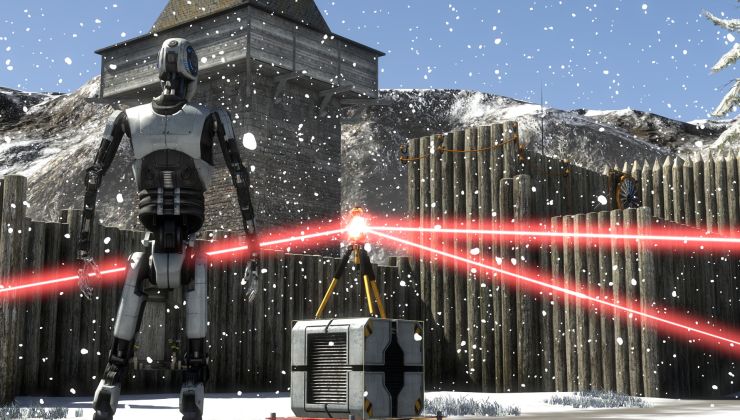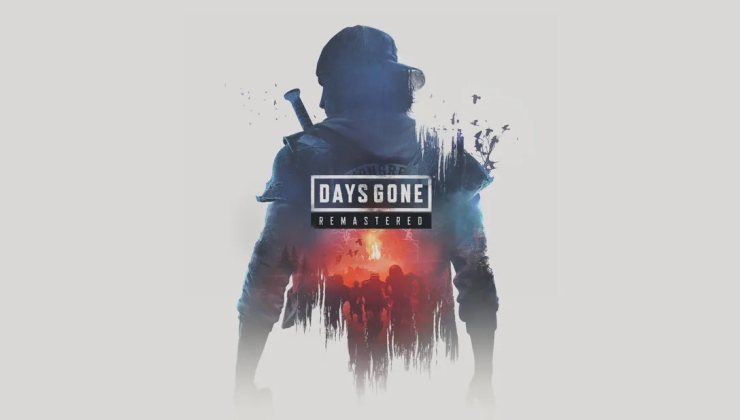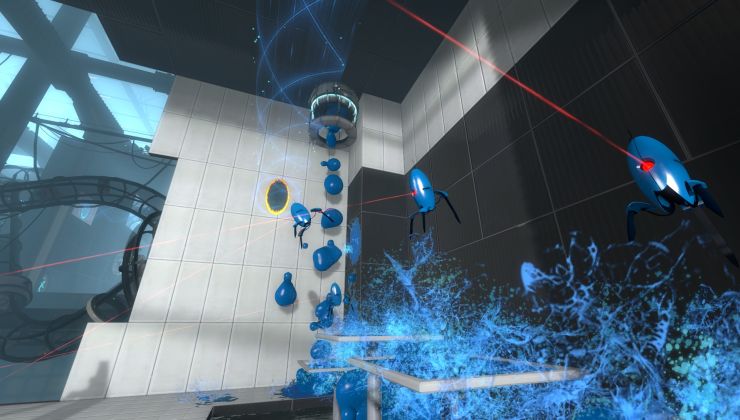Here's a bit of interesting industry news for you on this fine Monday afternoon. Alen Ladavac, who helped to co-found the Serious Sam and Talos Principle developer Croteam has moved onto game streaming.
Announcing their change on Twitter, which links to a post on LinkedIn, Ladavac wrote about how they were making games since the age of the Floppy disk but they're moving on:
[…] With a heavy heart, I've parted ways with my dear friends and colleagues at Croteam. I love you all, guys and girls, and I will never forget all the beautiful years I spent with you and fantastic things we've created. I'm super excited to announce that I'm starting at Google München, joining the awesome Stadia team to work on finally bringing gaming into the cloud. What was once deemed impossible, now is the reality - and I'm grateful for a chance to contribute to this landmark undertaking.
Considering their experience shipping games, along with helping to get games updated with Vulkan it's not a hugely surprising move. Probably a bit of a blow to Croteam though, as they're working on Serious Sam 4: Planet Badass which has no current release date set.
In other related Stadia news, Red Dead Redemption 2 has been confirmed at launch now as well. This is a huge bit of news, as it was previously only speculated that it was coming to PC but it's now confirmed for Stadia (as well as Steam for Windows).
Stadia is set to launch in November 2019, for those who put some cash up front to get the Stadia Founder's Edition. However, this edition is sold out in certain regions, with it being replaced with a Premier Edition which includes a plain White gamepad instead of the special Night Blue version.
It will be interesting to see how Stadia can capture the market. Especially since the software stack is using Debian Linux, the Vulkan API and it will work on any computer that can access a Chrome browser. Compared to other solutions which require another dedicated application, the barrier for entry at least when talking software is low. This will open up a lot more AAA gaming to be played on Linux, which is why we're keeping a close eye on it.
A hot topic though, considering how it's basically the ultimate form of gaming DRM. You don't technically own anything, the game never really touches your PC and you need to be online to play anything. Input latency and bandwidth use are big issues for some too. We've secured a copy of the Stadia Founder's Edition to cover sometime around the release for GamingOnLinux, let's wait and see if it can win us over.
Will you be trying it out? We've also opened a new dedicated forum for all game streaming topics including Stadia, Steam Remote Play and anything else.
*sigh* let me be a lot more specific then: What is the latest on getting the code accepted into Chromium/Chrome to enable it the same as it is on Windows?Ironically, the disadvantage of Linux with Stadia is that chrome doesn't support hardware acceleration in video decoding, so Linux will have a (slightly) higher latency than windows...What's the latest on this, I'm a bit out of touch since I use Firefox.
The latest is what I just said?
Will you be trying it out?Will I?
Well, I am not even allowed to (remember, only US and some selected few countries are elegible).
As I understand it, next year they will be expanding the regions so you might eventually I guess.Will you be trying it out?Will I?
Well, I am not even allowed to (remember, only US and some selected few countries are elegible).
... DRM is the correct word here.. They won't allow the Linux versions to leak to the public, I mean Doom has an Linux executable somewhere inside ID, they didn't release it...
I think it's the same kind of pipe dream that Streaming games from Finland to Sweden and then back to Finland, makes for great low latency experience.. Only way to bring ping down is to actually fast track route all Stadia packets and get rid of bad last mile dsl cable and 4g, even 5g is slow. 9ms on last mile is too much. oh and +40ms for the packet to travel from Finland to Sweden and then back to Finland.
Yes all Google Hamina Data center traffic travels this way... Well.. maybe they will make the game data centers to Sweden..
Latency between Finland and Sweden should be well below 40ms and trying out [http://www.gcping.com/](http://www.gcping.com/) i Actually have 41ms on average round trip latency between my 4G mobile wifi here in western Sweden (Göteborg) and the Hamina center in Finland.
I think this situation is slowly changing after AMD started to officially support Open Source drivers.Ahh, come on! nVidia has great Vulkan drivers and has been supporting Linux since who knows when (I switched from "Windows XP" in 2008 and even then the drivers were top-notch!). Unlike ATi/AMD which can not even provide a day-1 support for the shiny "RX5700" cards.
I was a NVIDIA guy a few years back, but now I'm pretty happy with AMD Radeon RX 590 :-)
But no, we must stay vigilant! We must continue our bashing on one of the leading graphics solutions companies because it is not open-source enough.
I am speaking as the one pretty happy owning a nVidia GeForce GTX 1660Ti :-)
Well, to be honest, I myself is a firm anti-DRM fighter, not even willing to tolerate Steam™, let alone this DRM_From_Hell-incarnation.As I understand it, next year they will be expanding the regions so you might eventually I guess.Will you be trying it out?Will I?
Well, I am not even allowed to (remember, only US and some selected few countries are elegible).
And besides, technically speaking, I share the "input lag" skepticism. May be it will be tolerable in some regions, but it will definitely not cover the whole "PC Marketshare".
After all, many have tried the "streaming service" model, many have failed. And what makes Google any different? A big name? Hardly sufficient, IMO.
Yet, it will be interesting to watch how this latest attempt will disrupt the "status quo" (with Vulkan being behind all of this).
Last edited by Alm888 on 8 Oct 2019 at 1:21 pm UTC
When we're talking about the consequences, Stadia will have on "Desktop gaming", I would argue, that offline gaming will die anyways, sooner or later. Developers/publishers don't want a second hand market for their games, therefore streaming is perfect for them (plus no anti-cheat necessary).
From a technical point of view: Why would any developer still bother with Win32-API/DirectX, if they a) don't want offline games anyways, and b) Vulkan exists for Windows as well.
For the midterm, this will mean: More titles will use "Linux-API", but will get released mainly for Windows, but run pretty good in a Proton environment.
Microsoft, oth, must support Vulkan for XBox someday, if they still want developers to port their games to XBox (everything else is Vulkan)
We mast continue our bashing on one of the leading graphics solutions companies because it is not open-source enough.
We for sure should not give them a pass for bad behavior of not upstreaming their drivers. They have no excuses. They are a bad player in the Linux ecosystem and they know it.
Last edited by Shmerl on 7 Oct 2019 at 5:24 pm UTC
For those who think's that Google Stadia will help to get anticheat games to run in Linux forget it, they probably will just remove the anticheat in the stadia versions, since in theory it's impossible to run third party software with it.Sounds very likely.
The only thing stadia might help Linux games is forcing developers to get familiarized with Vulkan and to not use Microsoft media foundation (Presuming that stadia won't fail either).Not just that. It might force the makers of game engines and various game-related middleware to improve and/or add Linux support, which could be beneficial for those developers that actually do have the intention to bring their games to the Linux desktop.
Of course, it's hard to say what will come of it. I personally am not convinced that streaming will work out for gaming the same way it does for TV and Radio. And even if it did, I would at least expect that all those really fine indie games that have no chance to get onto a streaming service initially will continue to fuel desktop gaming, on Linux and elsewhere.
We for sure should not give them a pass for bad behavior of not upstreaming their drivers. They have no excuses. They are a bad player in the Linux ecosystem and they know it.We for sure should not give AMD a pass for releasing and selling broken products to Linux users and act like it is completely normal.
What good are those "upstreamed drivers" if they do not work? GPU market is no charity, every company (AMD included) wants money. If AMD wants to cut expenses by essentially outsourcing their drivers to some enthusiasts/companies developing Linux kernel -- fine. But I must remind you that providing auxiliary software (mandatory for proper work of their sold hardware) is the company's direct obligation.
nVidia, on the other hand, provides its products in working order and on time and is its full right to chose how to do so (in nVidia's case -- by syncing the driver codebase with Windows).
If you are insisting that nVidia is a "bad player", then I must conclude that so is AMD.
The silver lining is: nVidia needs no excuses. Especially after being the only reliable GPU manufacturer in the most dire times for Linux (2006-2011), when most of the gaming/porting companies went belly-up and everything looked like gaming on Linux is a pipe dream (and honestly, it would seem totally wise to drop useless Linux driver).
"They have no excuses" -- these words just do not have merit in this case.
Honestly, this went too off-topic.
Last edited by Alm888 on 7 Oct 2019 at 7:04 pm UTC
So it simply means they don't have any support formally speaking. They work around it using blob with dkms, but that's not a solution for the problem they created themselves. I.e. no excuse as above.
Last edited by Shmerl on 7 Oct 2019 at 7:07 pm UTC
Last edited by Shmerl on 7 Oct 2019 at 7:22 pm UTC
Combined it means that Google really aren't reliant on AMD as much when it comes to support; Google can modify the kernel and drivers as they see fit, without needing to jump through support hoops.I have just read the terms of GPL to check whether they are obliged to provide source code for their changes…
Nope. (Because the program -- Linux kernel -- itself does not get distributed). :(
What a shame. It seems Google will have a chance to get away with this (unlike Sony or Nintendo which ended up using BSD in their consoles).
*sigh* let me be a lot more specific then: What is the latest on getting the code accepted into Chromium/Chrome to enable it the same as it is on Windows?Ironically, the disadvantage of Linux with Stadia is that chrome doesn't support hardware acceleration in video decoding, so Linux will have a (slightly) higher latency than windows...What's the latest on this, I'm a bit out of touch since I use Firefox.
The latest is what I just said?
Compile it yourself. Or so i've heard about month ago.
Stadia means nothing for Linux since all of those games will have VLK renderers tailored specifially for AMDVLK with no intent to run them on desktop platforms which is dominated by Nvidia hardware. These games will be in the stores with D3D.
I think this situation is slowly changing after AMD started to officially support Open Source drivers.
I was a NVIDIA guy a few years back, but now I'm pretty happy with AMD Radeon RX 590 :-)
I'm clearly talking about Windows. On Linux people have many reasons to use AMD but on Windows that is not the case.
Stadia means nothing for Linux since all of those games will have VLK renderers tailored specifially for AMDVLK with no intent to run them on desktop platforms which is dominated by Nvidia hardware. These games will be in the stores with D3D.
Well it remains to be seen what tailoring specifically for amdvlk means. If it means there are specific Vulkan extensions only in amdvlk, then perhaps. And perhaps it won't be tested much with other drivers. However, the games are being developed first on an actual GNU/Linux box. Multiple developers have said that is the first step to getting onto Stadia.
So while this may not translate into increased support for GNU/Linux desktop, I wouldn't say it "means nothing for Linux" (I'm an explicit person, so I'm going to assume you mean the desktop OS rather than the kernel). HLSL to SPIR-V (for example) basically got a big push from Google, for reasons of Stadia, and yet that helps on desktop too. Don't forget developer experience either. These may not directly translate to more games, but indirectly it helps reduce barriers and stabilise the experience for the end user.
Tailored for AMDVLK or Stadia means ; they are not being tested on NV gpu's.
I'm not expecting any Linux binaries of those games on Steam , GOG etc either. I'm saying we won't see those VLK renderers on PC in general. There will be d3d.
I meant desktop ofc :)
Stadia builds are no different than PS4 builds for example. One targeted api , one tested hardware combination which is able to give good performance even on the shittiest implementation.
*sigh* let me be a lot more specific then: What is the latest on getting the code accepted into Chromium/Chrome to enable it the same as it is on Windows?Ironically, the disadvantage of Linux with Stadia is that chrome doesn't support hardware acceleration in video decoding, so Linux will have a (slightly) higher latency than windows...What's the latest on this, I'm a bit out of touch since I use Firefox.
The latest is what I just said?
Linux GPU support in chrome is primarily done by Linux enthusiasts volunteering their time (of which there are many in Google). This particular thing has been low priority enough that so far no one has volunteered to do and maintain it (and the bigger problem is indeed maintenance, and addressing the flurry of bug reports on all sorts of hw). It's a sensitive feature too, imagine how mad any Linux user would be if they couldn't watch videos on youtube, so it can only be enabled if it's entirely bugfree. The fact that the hw-accelerated video decoding libraries on Linux don't have test suites also doesn't instill confidence.
I myself would like to tackle this, but I have so much on my plate, I could use help getting the initial code done.
Last edited by ShabbyX on 8 Oct 2019 at 1:24 am UTC
I myself would like to tackle this, but I have so much on my plate, I could use help getting the initial code done.
If you're not just trolling: there's already code being used by some distributions:
https://fedoramagazine.org/chromium-on-fedora-finally-gets-vaapi-support/
Even if AT&T deigned improve our .6Mbps DSL, I wouldn't pay Google for a game subscription service, not when they're making money off the data they'll be hoovering up from my---and everyone else's---gameplay habits.













 How to set, change and reset your SteamOS / Steam Deck desktop sudo password
How to set, change and reset your SteamOS / Steam Deck desktop sudo password How to set up Decky Loader on Steam Deck / SteamOS for easy plugins
How to set up Decky Loader on Steam Deck / SteamOS for easy plugins
See more from me